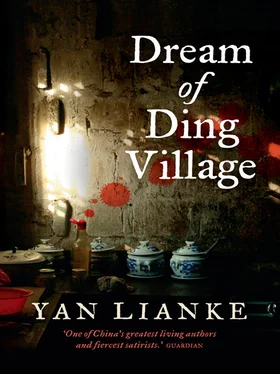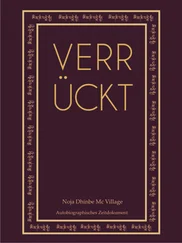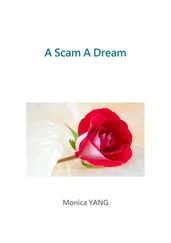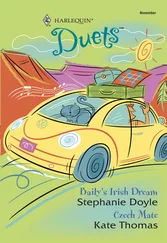‘There’s really new medicine?’ came a voice from inside.
‘I’ve been a teacher all my life,’ Grandpa laughed. ‘Have you ever known me to lie?’
At the next house, Grandpa pushed open the front door. ‘Hey. . don’t stay inside all day worrying. Join us at the school tonight for a zhuizi performance.’
‘Who’s playing?’ asked the man inside. ‘Is it Ma Xianglin?’
‘Who else?’ answered Grandpa. ‘You must have noticed he’s been getting sicker. If we all show up for his concert tonight, it might cheer him up a bit, give him the strength to last until the new medicine gets here.’
‘There’s really new medicine?’
‘I’ve been a teacher all my life. . have you ever known me to lie?’
And so it went, house after house.
When Grandpa reached New Street, he saw my parents and sister walking home. They had just returned from their field and my mother held several bundles of vegetables in her arms. When they caught sight of Grandpa, the whole family froze in their tracks, as if they’d run into someone they would rather not meet. Grandpa stood in the middle of the street, an awkward smile on his face.
‘Yingzi,’ he called to his granddaughter. ‘Come to the school tonight and listen to some songs and stories. It’ll be more fun than staying home and watching television.’
Before Yingzi could reply, my mother grabbed her by the elbow and hustled her into the house, brushing past Grandpa without a word.
After they had gone, my dad and Grandpa were left alone on the street, locked in a father-son stalemate. The sun overhead cast a harsh light on the walls and tiled rooftops of New Street. From the fields outside the village came the faintest autumn chill, mingled with the delicate fragrance of freshly turned soil. When Grandpa raised his head to find the source of this scent, he saw Zhao Xiuqin’s husband Wang Baoshan in the distance, working his private plot of land. Not long earlier, Wang Baoshan had decided to let the field go fallow. Since his wife had the fever, he’d said, what was the point in ploughing or planting? Pretty soon, he wouldn’t have any family left to feed. But now that he’d heard the news about the new medicine, he was back outside, working in his field.
Turning the soil helps to keep it moist.
There’s still time to plant some winter cabbage.
Even if we don’t plant this year, it makes sense to keep the soil in shape.
There’s always next year.
Grandpa watched Wang Baoshan at work, ploughing his field and turning the soil. He turned back to my father with a smile. ‘You should come to Ma Xianglin’s concert tonight, too.’
‘Why should I?’
‘Because the whole village will be there. It’s a good opportunity. You can kneel on stage and kowtow, tell everyone you’re sorry and that will be the end of it. One little apology, and we can put this whole mess behind us.’
‘Dad, have you lost your mind?’ asked my father, staring in disbelief. ‘No one in this village tells me what to do, least of all you. And no one else is asking for an apology.’
Grandpa looked carefully at his son’s face. It was as thunderously angry as a poster of a household god, those fierce deities that the villagers plastered on their doors to ward off evil spirits.
‘Do you take me for a fool, Hui?’ he snorted. ‘You think I don’t know that when you drew blood, you used the same cotton swabs on three or four different people? God only knows how many times you reused those needles.’
The look he received in return was pure hatred. ‘Old man, if you weren’t my own father, I’d slap you across the face.’ With this, my father brushed past Grandpa and followed my mother into the house.
‘Hui!’ Grandpa shouted at his son’s retreating back, ‘All right, I won’t make you kowtow in front of the whole village. But can’t you at least say a few words of apology?’
My father didn’t even bother to turn around. He had heard enough.
‘You’re not even willing to apologize?’ Grandpa pleaded, chasing after him. ‘Is that what you’re telling me, son?’
As my father reached the courtyard gate, he paused. ‘Don’t waste your time hating me,’ he spoke loudly and clearly. ‘Because before the end of this year, I’m moving my family out of the village and you’ll never see any of us again.’
My father ducked into the courtyard and slammed the gate behind him, leaving Grandpa standing like an old wooden hitching post on a new and more fashionable street.
But Grandpa had the final say: ‘Mark my words, Hui. . you’ll come to no good end. You just remember that!’
2
Later that day, after the sun had set and the moon had risen, the villagers gathered at the school for music, songs and storytelling.
Using electrical cables from the classrooms, Grandpa and some of the village men rigged up several 100-watt bulbs and hung them from the basketball hoop, flooding the schoolyard with incandescent light. They placed wooden doors on piles of bricks to construct a makeshift stage. To this, they added a high stool for Ma Xianglin to sit on as he performed, and a slightly lower stool with a teapot and mug, in case he got thirsty. Once everything was in order, the performance could begin.
Villagers crowded into the basketball court in front of the stage, both the sick and the healthy sitting cross-legged on the ground, eager to join in the fun and see what all the fuss was about.
Nearly 300 villagers had turned out to see the concert. They filled the basketball court and the schoolyard like a flock of crows in a field. The sick sat towards the front, near the stage. Those who were healthy, still untouched by the fever, sat at the back.
The season was nearly over, and a late autumn chill had crept into the still night air. In Two-Li Village, Willow Hamlet, Yellow Creek and other nearby villages, they felt it too. The late autumn chill had spread through the county, the province, and all across the plain.
Some of the villagers who had come to see Ma Xianglin perform wore padded cotton jackets or had them draped over their shoulders. For those with the fever, catching cold was of vital concern: already more than a few people in the village had caught a cold and died. Even the tiniest cold could be life-threatening for someone with a weakened immune system, and the sick villagers sat huddled in their padded coats as if it was the middle of winter. The schoolyard was a jumble of laughing, chattering people. They talked about the new medicine and the fact that the fever could now be cured with a single injection. They talked about their good fortune and traded words of consolation, each as fragile as the wings of a cicada.
By now, the moon had risen over the schoolhouse. Ma Xianglin sat on the stage, perched on a stool clutching his fiddle. His face had a greenish tinge, the colour of death. The villagers realized that Ma Xianglin’s illness had reached a critical stage, and that he didn’t have much longer to live. If the new medicines didn’t get there soon, he would probably be dead within a couple of weeks.
And yet if he could spend each day like this, playing his fiddle and singing his cares away, maybe he could alter his fate. Maybe the difference between life and death really was that simple. Maybe he would manage to hang on for a few more weeks, or even a few more months. As long as he was willing to sing, and the villagers were willing to listen.
Grandpa emerged from his rooms with a thermos of hot water and two empty bowls. ‘Anyone thirsty?’ he called to the people gathered in front of the stage. He even bent down to ask several of the elderly villagers if they wanted anything to drink. When everyone had assured him that they were fine and not at all thirsty, Grandpa placed the thermos and bowls in a corner of the stage and turned to the ailing Ma Xianglin.
Читать дальше












